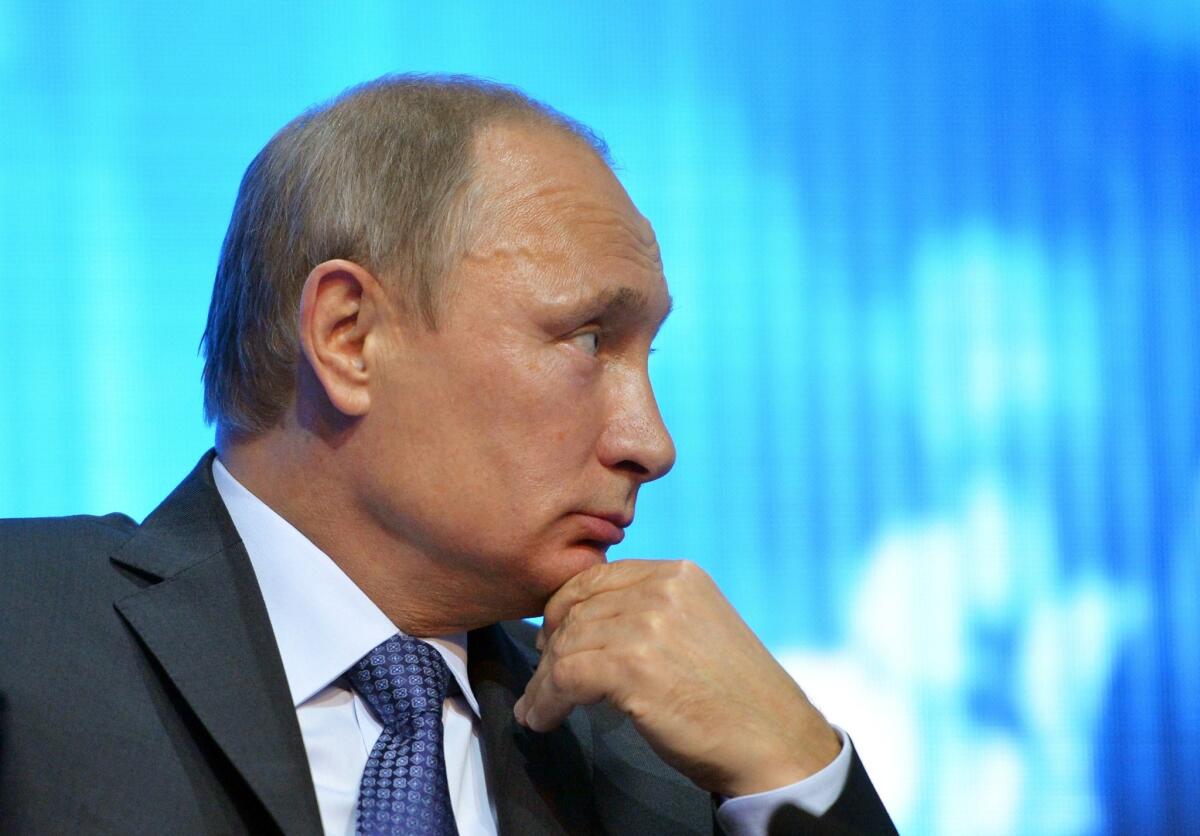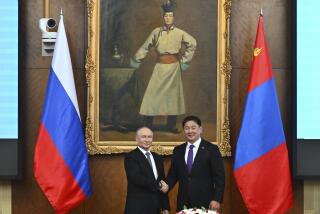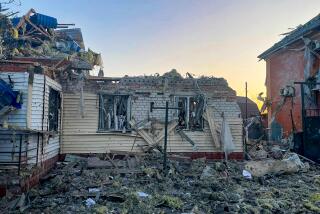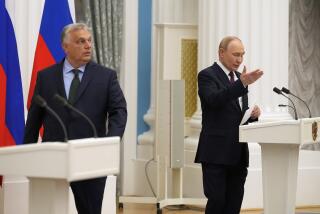Putin defiant in face of criticism over Ukraine at Asia-Europe summit

A defiant Russian President Vladimir Putin joined Asian and European leaders in Italy on Thursday for talks intended to focus on trade but, like many diplomatic gatherings of the past six months, was being dominated by the deadly crisis in Ukraine.
Putin was put on notice before the two-day Asia-Europe Meeting in Milan that he would be pressed to genuinely conform to a Sept. 5 cease-fire that calls for an end to the armed conflict in eastern Ukraine.
Despite the agreement signed six weeks ago by Russia, Ukraine and pro-Russia separatist gunmen who have seized key industrial areas along the Russian border, artillery exchanges have continued and hundreds of fighters and civilians have been killed, boosting the death toll in half a year of undeclared war to nearly 4,000.
The 53 nations of the Asia-Europe Meeting, or ASEM, represent 60% of the world’s population and more than half of its economic activity. While the annual gathering has seldom produced major agreements or diplomatic breakthroughs, it is seen this year as an opportunity to bring pressure to bear on Putin to use his influence with the separatists to end the Ukraine bloodshed.
But Putin set out for the summit with a brash warning to Western leaders that sanctions and accusations won’t lead to peace.
President Obama’s depiction of Putin during a U.N. speech last month as one of three “major threats to humanity” along with the Ebola epidemic and Islamic State extremists spurred an ominous retort from the Kremlin leader on the eve the Milan gathering.
“We hope that our partners will realize the futility of attempts to blackmail Russia and remember what consequences discord between major nuclear powers could bring for strategic stability,” Putin told Serbia’s Politika newspaper. It was the second time in as many months that Putin reminded Washington and Ukraine’s Western European allies of Russia’s nuclear capabilities.
He called Obama’s posture toward Russia “nothing but hostile,” and warned that moves to isolate Russia over its purported role in the Ukraine violence was “an absurd and illusory goal.”
Putin has repeatedly denied that Russia has a hand in the fighting in Ukraine’s Donetsk and Luhansk regions that has wrested control of the largely Russian-speaking eastern industrial centers from the Ukrainian government in Kiev. However, separatist leaders have conceded they are supported by Russia and that much of the military operation has been directed by Russian special forces veterans and mercenaries. NATO, the Western military alliance, has also released satellite images of Russian tanks and armored vehicles moving across sections of the Ukrainian border with Russia that are under rebel control.
Putin attempted to cast himself as a facilitator of peace earlier this week when he announced through his spokesman that the 17,600 Russian troops deployed along Ukraine’s border, ostensibly for maneuvers, had been ordered to return to their bases. NATO’s supreme allied commander in Europe, U.S. Air Force Gen. Philip Breedlove, told journalists during a visit to Greece on Wednesday that the alliance had yet to see any significant Russian withdrawal from the volatile border area.
Putin and Ukrainian President Petro Poroshenko have a breakfast meeting in Milan scheduled for Friday, their first face-to-face discussion since meeting at D-Day ceremonies in France on the day before Poroshenko’s June 7 inauguration. The two also shook hands in an icy encounter in Minsk, Belarus, where the cease-fire was brokered and signed six weeks ago.
German Chancellor Angela Merkel signaled at the start of the ASEM summit that she expected Putin to show convincing steps toward making the Sept. 5 cease-fire “a reality.”
“Russia must make the decisive contribution to de-escalation,” Merkel told lawmakers in Berlin before setting off for her Thursday night meeting with Putin on the sidelines of the Milan summit.
Merkel listed three demands she intended to make of the Kremlin leader: pull back all Russian armed forces from Ukraine’s border, allow the Ukraine-Russia border to be secured and monitored by the Organization for Security and Cooperation in Europe, and allow Ukraine’s Oct. 26 elections for a new parliament to take place on all Ukrainian territory.
The German leader has also said Russia must relinquish the Crimean region seized from Ukraine earlier this year and illegally annexed to Russia.
Putin, in his interview with Politika, which was translated and released by the Kremlin press service, repeated his position that ethnic Russians and Russian-speakers in Ukraine were threatened by a resurgence of neo-fascism after Kremlin-allied President Viktor Yanukovich was deposed by a pro-Europe rebellion in February.
Putin has vehemently fought against Ukraine’s pursuit of membership in the European Union and NATO. While both Kiev and Brussels officials have conceded that joining the Western military bloc isn’t a desired development for the near-term future, Kiev has entered into a trade agreement with the 28-nation EU over which Putin has threatened to impose punitive trade barriers on its Western-drifting neighbor.
Among the Milan summit participants wanting a word with Putin on the sidelines is Australian Foreign Minister Julie Bishop, who the Herald Sun newspaper reported was keen to discuss the Malaysia Airlines Flight 17 disaster with the Russian leader widely accused of having supplied the missile that brought down the plane over Ukraine on July 17. All 298 on board died in the crash, including 38 Australians.
Australian Prime Minister Tony Abbott on Monday threatened to “shirt-front” Putin when they are both expected at a Brisbane summit of the Group of 20 nations next month, using an Australian slang term for knocking someone to the ground.
No bilateral meeting between Putin and Abbott is scheduled during the G20 summit, the Herald Sun noted, but the host leader indicated he expected Putin to respond to his demands for an accounting of the Flight 17 “atrocity.”
“I certainly expect that while he’s a guest of Australia, he will undertake to have a conversation with the Australian prime minister,” Abbott said.
A spokesman for the Russian embassy in Canberra, Alexander Odoevski, told the Australian Associated Press that Abbott’s threat was “immature.”
Follow @cjwilliamslat for the latest international news 24/7
More to Read
Sign up for Essential California
The most important California stories and recommendations in your inbox every morning.
You may occasionally receive promotional content from the Los Angeles Times.










